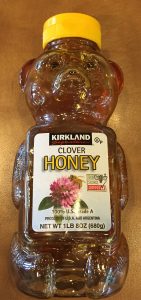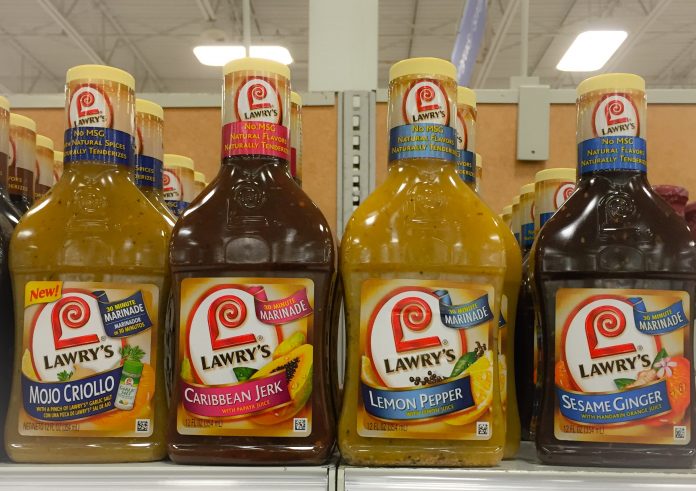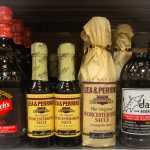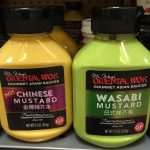When we grill small, whether on a dedicated smaller outdoor grill, inside on a cast iron grill pan or using an indoor grill machine, getting flavor into our meats and vegetables is the priority. Although most associate grilling with “smokey” grilling is really a high heat searing method of cooking that may or may not produce smoking. Grilling allows us to highly caramelize (read here as “grill marks” or “brown”) the outside of our meats and vegetables without drying the interior. What is the goal? Flavor. And nothing introduces flavor better than a marinade.
Grilling with a Side of Word Salad
Grilling has the advantage and disadvantage of being a homegrown style of cooking. After all, when we first found fire and a rock we started grilling. But unlike making a soufflé or sauce veloute, grilling doesn’t have as many ground rules or the pantheon of defined “technique” like other styles of cooking, which makes grilling as personnel as how we like our eggs. The downside is that there is a veritable word salad of terms, techniques, and opinions on what it means to “grill”. Here is a short list: grill, sear, smoke, direct heat, indirect heat, wet smoke, cold smoke, brine, marinade, dry rub, and inject are just a few of the words you will hear thrown around at an outdoor BBQ filled with foodies.
When grilling in smaller quantities we are basically talking searing. This is what makes “grill marks” and that lovely dark brown outside with nice juicy inside. It is very easily obtained with indoor grill pans and machines and can also be obtained on our outdoor grills with a bit more attention. It may or may not involve some smokey flavor (on an outdoor grill the smoke comes from juice, fat, and oil dripping on the heat source). However, it almost always involves a “pure” cut of meat, dense fish, or thick cut vegetable.
Five Things in Marinade Heaven
First, we apologize to Mitch Albom. However there are only 5 components to a marinade: oil, acid, salt, sugar, flavorings.
If you think this sounds like a vinaigrette you would be correct. In fact, your favorite vinaigrette is fine to use as a marinade. Most likely it will be a little “oily” and may lack a sugar component but it will work. However, there is no reason to limit yourself to what would taste good on a salad. Marinades tend to be bolder in flavor. They are going on meats or vegetables that will be grilled so they act as a seasoning rather than a dressing. Here are the components:
Oil: Keep it simple. You want a high heat oil. That is NOT extra virgin olive oil (generally). A simple clean oil with a high smoke point is best. Flavor will be carried with the other ingredients. Reasonable oils, in order of smoke point, are safflower, peanut, sunflower, canola, light/refined olive. Remember, the oil is an assist not the star of the show so keep in simple and not too expensive.

Acid: Straight up this means vinegars, wine, or citric/fruit juices. We can not recommend highly enough doing some experimenting. There are the obvious choices, like red wine vinegars, lemon or lime juice, and wine. However, the selection of vinegars is unlimited and there are other juices to try. Two caveats. First, if using something that has a lot of natural sugar, like balsamic, a sweet wine, or a fruit juice (like orange or apple), you can omit the sugar component. Second, be careful with fruits like pineapple and papaya. They will turn the meat “mushy”
Salt: Yes, it can be Kosher. However, it can also be soy sauce, Worcester sauce, or any of the wide varieties of seasoning salts.

Sugar: You don’t need much but a little does a great deal. First, it helps in browning. Second, it balances the acid. Although something like sugar is fine honey is perhaps the best choice.
Flavorings: Like a vinaigrette, this is anything else you want to add. It can start with something as simple as pepper. It can also be herbs, ginger, wasabi, hot sauce, chipotle and/or chili powders, and mustards (or dry mustard), fresh grated garlic or onion, or onion/garlic juice. The possibilities are truly endless.
- ¼ cup red wine vinegar
- ½ cup high smoke point oil (like safflower or canola)
- 1 tsp kosher salt
- 1 tbs honey
- 1-2 tsp "steak" seasoning
- Whisk together all ingredients in a shallow glass or plastic dish (metal is not recommended). You can whisk in a bowl then transfer to a zip lock bag or vacuum sealer bag.
- Place meat, fish, or vegetables in the marinade and completely coat. Cover dish or seal bag and place in the refrigerator. If in a dish turn at least once during the marinade time.
- Most fish and vegetables will marinate in less than an hour. For denser products like chicken breast, steak, or pork, marinate for up to 2-3 hours
- This should easily marinade 1-2 lbs of meat
Portion Control and Time Management
If you want to put marinades in the culinary perspective, they are basically 2:1 vinaigrettes. Use two parts oil to one part acid. Remember that marinades are “surface treatments”. Most won’t penetrate that deeply into the meat (which is brining and a whole other subject) so think bold flavors and 1-2 hours (for fish about 30 minutes). ALWAYS marinate in the refrigerator and NEVER reuse a marinade. Finally, many vacuum sealers have marinate settings and trays. The vacuum process helps the marinade penetrate into the meat so try it out! The vacuum sealer method will also reduce the time.
Above all experiment with flavorings. Be bold and be creative. And cook some extra, especially chicken breast. We pay outrageous prices at the store for “grilled chicken strips” to top our salads when, with a little marinade, we can make two or three salads worth at the same time as dinner. So crank up the grill, soak some food, and enjoy the summer with one of the first, and in many people’s opinion, best way of cooking!













